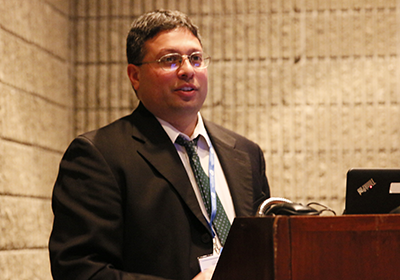Psychiatrist Gives Inside Look at Fort Hood Shooting

The U.S. Army psychiatrist who killed 13 people at Fort Hood, Texas, on November 5, 2009, eventually revealed to members of a military sanity board the development of the thinking that led to the crime, said Kaustubh Joshi, M.D. (pictured above), who chaired the group at APA’s 2016 Annual Meeting in Atlanta today.
Maj. Nidal Hasan, M.D., the American-born child of Palestinian immigrants, also wounded 32 other people on that November day before he was shot by two police officers and paralyzed. He was tried and convicted in 2013 for the crimes. His case is undergoing a mandatory appeals process. Joshi said he could finally discuss the case now that Hasan had been tried and a verdict rendered.
Sanity boards are appointed by the military judge in charge of a court martial, not by the prosecutor or defense, said Joshi, then an Air Force psychiatrist and now an associate professor of clinical psychiatry at the University of South Carolina School of Medicine. An Army psychiatrist and a Navy neuropsychologist were the other members of the board. They had to decide whether Hasan understood the nature of his actions and was competent to stand trial.
Joshi and his colleagues reviewed 10,000 documents, interviewed witnesses, and evaluated Hasan for about 13 hours over a three-day period in December 2010. They found a quiet, socially awkward man whose life changed slowly but dramatically after a series of personal and national tragedies: the deaths of his father in 1998 and of his mother in 2001, followed by the September 11 terrorist attacks. He was then a student at the Uniformed Services University of the Health Sciences (USUHS) in Bethesda, Md. Hasan had struggled in medical school, but was granted a leave of absence to take care of family affairs and, he told Joshi, “contemplate the meaning of life.”
Together, those events led him to a deeper involvement with religion. “Islam became more of the focus, not simply a focus of his life,” said Joshi. “It filled the void created by his parents’ death for a moral compass.”
After the United States attacked Afghanistan and Iraq, Hasan concluded that the country was fighting an unjust war against Islam.
“He could not balance being a Muslim with his obligations as an American military officer,” said Joshi. “He said that he was on the wrong side [as a U.S. soldier] and that he switched sides.”
Hasan graduated from USUHS in 2003 and entered residency at Walter Reed Army Medical Center. He was counseled about preaching to his patients and was cited for a “lack of professionalism and work ethic,” but he was allowed to graduate from residency in 2007. He spent the next two years in a disaster and preventive psychiatry training fellowship at USUHS and then was assigned to Fort Hood prior to an overseas deployment.
Hasan told the board that he had begun contemplating doing something violent but told no one. In fact, said Joshi, he had no history of violence before the attack at Fort Hood. His views of his religion may have been extreme, but they were not delusional, said Joshi.
In the end the sanity board concluded that Hasan was not suffering from a mental illness at the time of the crime, nor did he have any clinical diagnosis. At the time of the crime, he was not “unable to appreciate the nature and quality and wrongfulness of his conduct.” Finally, he understood the charges against him and was competent to stand trial, said the board.
Hasan said he wanted to become a martyr, either at Fort Hood at the time of the shootings or by the death penalty, said Joshi. “He denied having remorse for his actions.”
|
|
|
|
|


